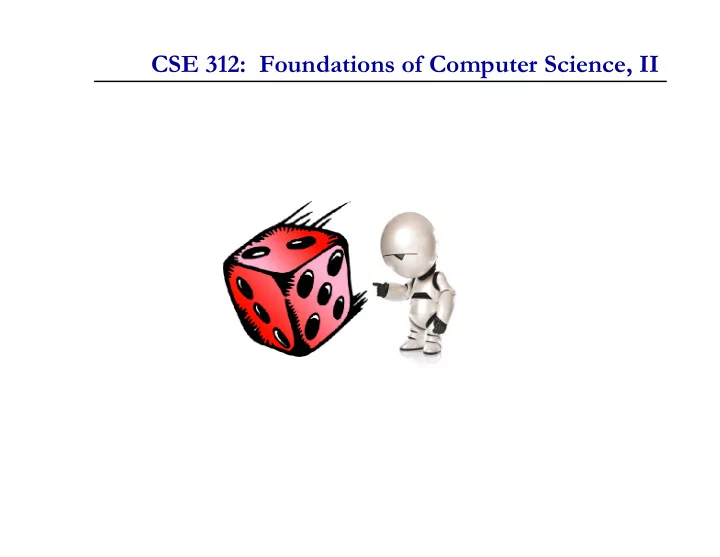

CSE 312: Foundations of Computer Science, II
CSE 312: Foundations of Computer Science, II Instructor: Anna R Karlin (karlin@cs.washington.edu) Tas: Dimitrios Gklezakos Tom Guo Stephen Jonany Kane Swanson
CSE 312: Foundations of Computer Science, II Course website http://www.cs.washington.edu/312/ Calendar will have everything on it!
CSE 312: Foundations of Computer Science, II - Probability and statistics - Books Introduction to Probability (2 nd ed.) Bertsekas and Tsitsiklis [required] Discrete Mathematics and its Applications Rosen [optional] - Slides Most are minor mutations of slides prepared by previous instructors of this course: James Lee, Larry Ruzzo, Pedro Domingos
CSE 312: Foundations of Computer Science, II - Homeworks ~ 40% Weekly (Out Wed eve, due Thursday in section) we will grade a random subset of problems. - Daily problem ~ 5-10% shouldn’t take more than 10-20 minutes. due at the beginning of most classes . can skip it 4 times during the quarter. - Midterm & Final ~20% & 35% Lots of office hours, starting next week!
syllabus - Probability Counting Basic probability Conditional probability Random variables Discrete and continuous distributions Expectation and variance Tail bounds and the central limit theorem - Statistics Maximum-likelihood estimation Bayesian estimation Hypothesis testing Linear regression Machine learning
pretend you’re a doctor You are trying to diagnose the probability that a woman with a positive mammogram has breast cancer, even though she’s in a low- risk group: 40-50 years old. - Probability of a woman having breast cancer is 0.8% . - If someone has cancer, probability of a positive mammogram is 90% . - If someone doesn’t have cancer, probability of a positive mammogram is 7% . A woman walks into your office with a positive test. What’s the probability that she has breast cancer?
pretend you’re a lawyer OJ simpson murder trial Prosecutors: “A slap is a prelude to homicide.” Defense: “ Less than 1 in 2500 men who commit domestic abuse go on to commit homicide.” Both were considering the wrong question: If a woman is murdered and she has been domestically abused, the chances are 90% that her husband is the killer.
Bayes rule
why this course is important - Reasoning under uncertainty - Understanding massive data - Learning patterns - Exposing liars and idiots - Making $$$ without coding
syllabus - Probability Counting Basic probability Conditional probability Random variables Discrete and continuous distributions Expectation and variance Tail bounds and the central limit theorem - Statistics Maximum-likelihood estimation Bayesian estimation Hypothesis testing Linear regression Machine learning
Recommend
More recommend